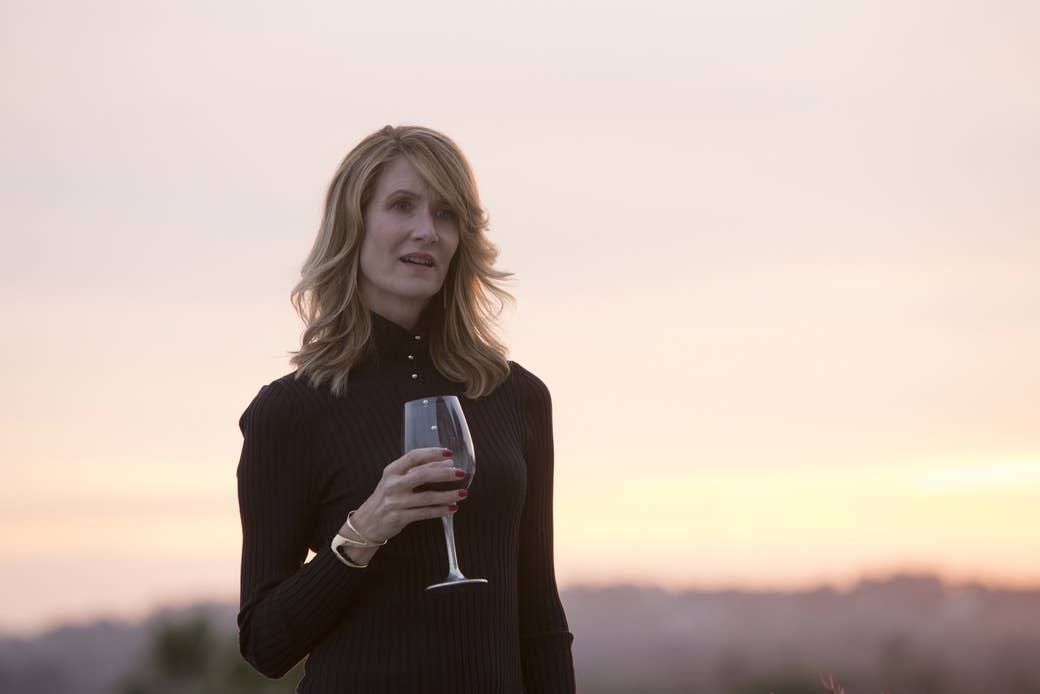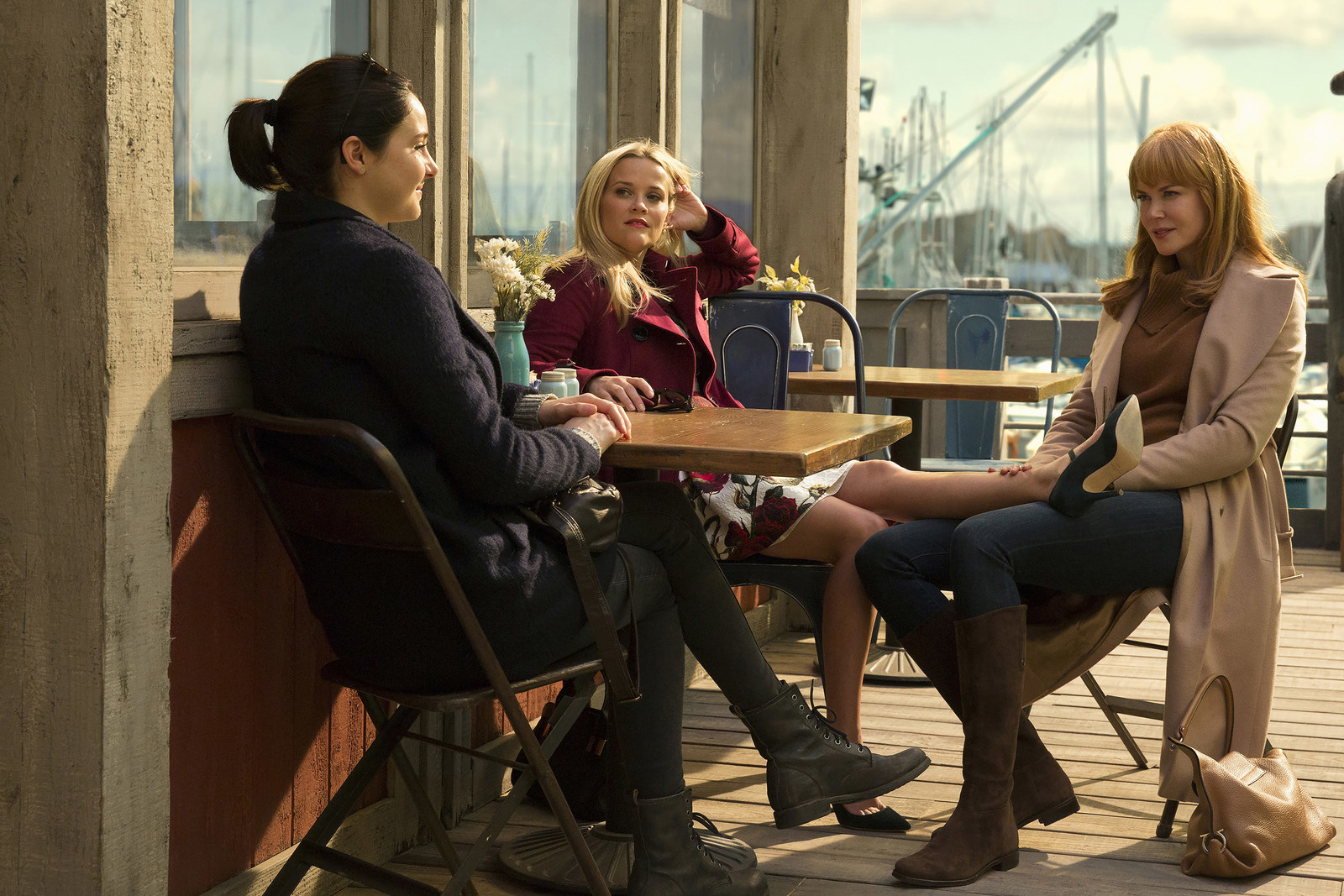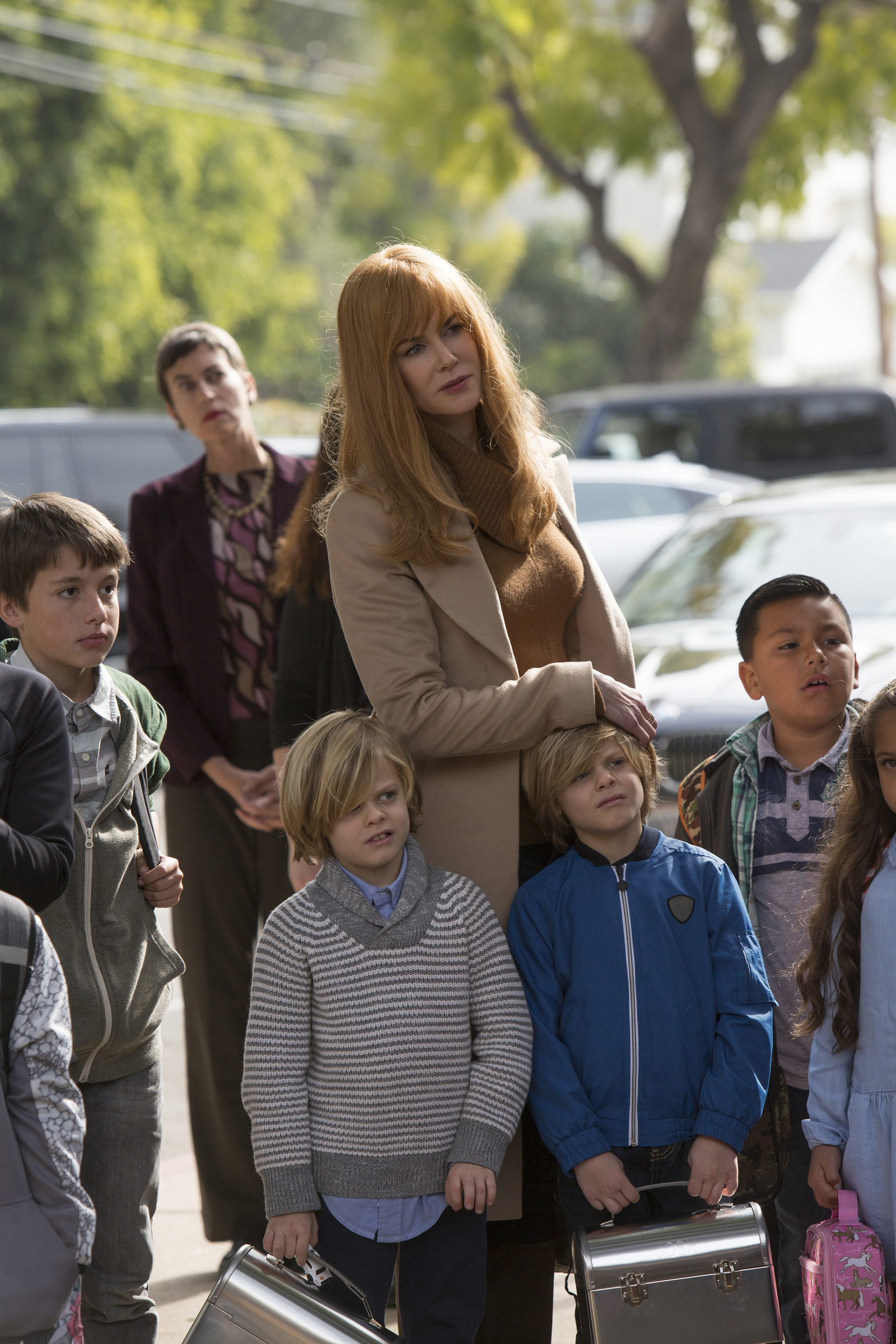
At the beginning of Big Little Lies — a new HBO limited series based on the 2014 Liane Moriarty book of the same name — we learn that someone has been killed at a fundraiser for the local elementary school. We don’t know who committed the murder; we don’t even know who’s dead. The series details the events leading up to the murder, and as the story unfolds, it becomes clear that there are more than a few people who have a motive to kill, and more than a few who could have been the target. But the series, like the book it's based on, is more than a murder mystery. It’s an exploration of how the parents in a community of extreme wealth use their children as pawns in a complicated game of one-upmanship.
In this town, parenting, but particularly motherhood, seems performative — mothers use their children to assert their own status, form alliances, and cast others out. And each mother’s performance seems to be largely in the service of managing her anxiety over the professional choices she’s made (to work, or not to work, or to do one kind of work versus another). It's like Tiger Moms meets Mean Girls meets Gone Girl, and the combination is apparently working: The premiere had over 2 million multiplatform viewers (way better than other HBO limited series like The Young Pope and The Night Of, if not as good as the premiere of a hit show like Westworld).
The show is a post-"having it all" microcosm; in a world where even the wealthiest, most privileged women have decided they can't have everything, what does that mean for everyone else?
Moriarty is a wildly popular Australian writer whose soapy thrillers, which have titles like The Husband's Secret and The Hypnotist's Love Story, usually focus on the troubles beneath the surface of the lives of upper-middle-class women. (As Janet Maslin wrote in the New York Times: "The Husband’s Secret was full of women with ethical and emotional issues, men with possibly criminal ones, and contentious goings-on at a school. Big Little Lies has all that and more.") Big Little Lies was originally set in a fictional beach suburb of Sydney, but the HBO show, which lists Reese Witherspoon and Nicole Kidman among its producers, has been transposed to the Monterey Peninsula. Silicon Valley is just close enough for the only working mom, Renata (Laura Dern), to be a high-powered executive who sits on several boards of tech companies.
But most of the mothers on Big Little Lies don’t work outside the home, and feel threatened by Renata and her career. Here, the idea of “having it all” has been recast to mean not just managing both a career and a family, but doing all that and then having a drink on your patio overlooking the ocean while plotting how to psychologically wound your frenemy. In that way, the show is a post–“having it all” microcosm; in a world where even the wealthiest, most privileged women have decided they can’t have everything, what does that mean for everyone else?
The implication, of course, is that whatever choice these women make, it’s never the right one. The show brings to mind Ivanka Trump’s #WomenWhoWork hashtag and platform, which valorizes a particular type of working woman who always has it “together,” but which fails to see how the options available to many women are necessarily circumscribed by broader sociocultural forces. As the tagline of the series states: “A perfect life is a perfect lie.”
Certainly, many of the questions around this particular feminist dilemma have been debated to death, and in a moment when the divisions between rich and poor have never felt starker, it's in some ways hard to feel sympathy for these mostly very privileged women and their problems. And yet, it works — in part because the women seem acutely self-aware. As Emily Nussbaum wrote in The New Yorker: "Like cast members on a reality show’s third season, each woman is hyperconscious of her own 'type,' and, by extension, how the culture sees her story, through condescending lenses like chick lit and mommy wars." By giving it this meta-lens, the series makes their stories — if not relatable, per se — then at least compelling.

Reese Witherspoon plays a woman named Madeline Mackenzie, who seems to be a grown-up version of Tracy Flick, Witherspoon’s type A character from the 1999 movie Election. Madeline is hyperaware of the pecking order of the mothers at her daughter’s elementary school — and when she takes Jane Chapman, the new mom in town played by Shailene Woodley, under her wing, it sets in motion a series of events that seem to lead up to the murder at the fundraiser.
Manipulation and alliances may be how Madeline thrives, but that doesn’t mean she’s happy. She’s consumed with resentment toward her ex-husband Nate, who lives in Monterey with his second wife Bonnie (Zoë Kravitz), and whose daughter is in Madeline’s daughter’s class. She also embodies the particular anxiety of the wealthy, white, educated woman who feels that somewhere along the way, she gave up on her ambitions. It's no coincidence that Madeline still dresses like she's going to work in an office, in heels and formfitting dresses, while Bonnie — a fitness instructor who also makes jewelry, and one of the few women of color in the community — embodies the laid-back bohemian life.
When Madeline first meets Jane, a single mom who's just moved to town with her 6-year-old son Ziggy, Madeline confides, "I'm happy to welcome another full-time mom to the ranks. You know, sometimes I think it's like us, against them, the career mommies?
Instead of a career, Madeline has had her children, and it becomes clear that facing the prospect of losing that job is a central crisis in her life. In Episode 1 (“Somebody’s Dead”), Madeline talks to her husband Ed (Adam Scott) on the beach in front of their beautiful house at sunset. She’s upset that both her children are asserting their independence in different ways: Her older daughter, 16-year-old Abby (Kathryn Nelson), is getting closer with her stepmother Bonnie, and her younger daughter, 6-year-old Chloe (Darby Camp), is starting school.
“I just feel like they’re gonna grow up and they’re gonna be gone, and this’ll be you and I, and we’ll be on to another chapter, and you have another chapter,” Madeline says. “You have a business. And I don’t. I’m a mom. This is my universe.”

Later in the first episode, there’s a a different oceanfront conversation between Renata Klein (Laura Dern) and her husband (Jeffrey Nordling); their daughter Amabella is Chloe’s classmate. “I’m not liked,” Renata says. “It’s one thing to be demonized for having the temerity of a career. But look at this. Look at our life. What kind of person chooses to work? Certainly not a mother, by any acceptable standards.” Both women are reassured by their husbands, but the sentiments linger. On the show, they've been set up as enemies — but they essentially have the same anxiety. That's what Big Little Lies excels at: honing in on the pressure points in lives of extreme privilege, and the ways in which, for women especially, these lives can still fall short.
Meanwhile, Nicole Kidman’s character Celeste, who is in an abusive marriage with her husband Perry (Alexander Skarsgård), gave up a career as a lawyer and stays home with her twin boys. In a later episode, Madeline asks Celeste for help in a legal dispute with the city; this enrages Perry, who, in couples therapy with Celeste, tells the therapist that he's afraid of losing her. Until this point, Celeste hasn't seemed as conflicted about staying home with her children as Madeline, but this meeting appears to awaken something dormant in her that might presage a future where she once again finds meaning in working outside the home.
None of these three women really know what to make of Jane, who's much younger than the rest of the moms in town and has moved to Monterey with her son Ziggy under mysterious circumstances. Unlike the other women, whose houses have been called "the best real estate porn on television," Jane lives in a small apartment away from the beach and sleeps in a pull-out bed; she works part-time as a bookkeeper. Jane clearly makes some of the other characters — particularly Renata — uncomfortable, because she's completely eschewed the high-powered game they're playing.
Jane's decidedly not privileged; it seems like moving to Monterey took real sacrifice for her, and she's struggling to balance the same questions about work and motherhood but with fewer resources and no partner. Madeline has taken her under her wing in a way that is reminiscent of Cher Horowitz and Tai in Clueless; Madeline clearly sees Jane as a kind of project, someone who will need her — unlike her children. But when Jane confesses the violent circumstances of her son's conception, Madeline starts to realize that Jane needs her in a different way than she thought. The confession deepens their relationship, but also complicates it. Jane doesn't necessarily make Madeline reframe her own anxieties, but she does help put them into sharp relief.
When I read the original novel a couple years ago, it seemed like a fun, frothy distraction, despite some of its darker themes; Moriarty's books are perfect beach or vacation reading. But the show has raised the stakes of the source material and in the process, made it into something much richer — one that, for professional women in particular, feels especially resonant now. It's not necessarily helpful to have Sheryl Sandberg admonishing us to #LeanIn or Ivanka Trump selling us "appropriate" work shoes or to know that Marissa Mayer went back to work two weeks after having twins, but it is satisfying to see a fictional universe in which even the Sheryl Sandbergs of the world do not, by any means, have their shit together.
